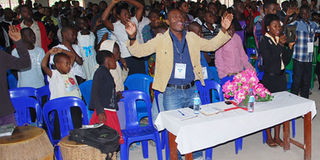Prime
Let us embrace freedom of religion

Children during a prayer retreat in Mbarara. The right to manifest religion is given by law. PHOTO BY RAJAB MUKOMBOZI.
What you need to know:
- FYI. Most of the world’s conflict stem from a denied right to religious practise. Yet, this is one of the most important human rights . By Msgr. John Wynand Katende
Uganda is said to be the largest refugee-hosting country in Africa, with more than a million refugees, most of them from neighbouring countries. Additionally, the government of Uganda has accepted a request from the USA government to host at least 2000 refugees from Afghanistan, following the takeover of the Taliban government in the country. Absurdly, many refugee cases are a result of violation of people’s freedom of religion.
Freedom of religion has been described as a principle that supports the freedom of an individual or community, in public or private, to manifest religion or belief in teaching, practice, worship, and realise places of worship. It also includes the freedom to change one’s religion or beliefs, the right not to profess any religion or belief or not to practice a religion. It also guarantees the right to establish and maintain charitable and humanitarian institutions, solicit and receive funding.
Freedom of religion is guaranteed by article 18 of the Universal Declaration of Human Rights.
In a country with a state religion, freedom of religion is generally considered to mean that the government permits religious practices of other sects besides the state religion, and does not persecute believers in other faiths.
Importance of these rights
Government should also help create conditions favorable to the fostering of religious life, so that the people may be truly enabled to exercise their religious rights and to fulfill their religious duties. This also helps society itself to profit by the moral qualities of justice and peace which have their origin in people’s faithfulness to God and to His holy will. It is one of the major tenets of Catholic doctrine that man’s response to God in faith must be free.
The family, since it is a society in its own original right, has the right to freely live its own domestic religious life under the guidance of parents. Parents, moreover, have the right to determine, in accordance with their own religious beliefs, the kind of religious education that their children are to receive.
It follows that a wrong is done when government imposes upon its people, by force or fear or other means, the profession or repudiation of any religion, or when it hinders people from joining or leaving a religious community.
In the use of all freedoms the moral principle of personal and social responsibility is to be observed. Society has the right to defend itself against possible abuses committed on the pretext of freedom of religion.
The Catholic Church acknowledges that the social nature of human beings requires that they should give external expression to their internal acts of religion, that they should share with others in matters religious and that they should profess their religion in community.
What the Bible says
Jesus says in John 4:24, “God is a Spirit and they that worship Him must worship Him in spirit and in truth.” Hence people are bound in conscience but they stand under no compulsion. God has regard for the dignity of the human person whom
He Himself created and man/woman is to be guided by his/her own judgment and he/she is to enjoy freedom.
In attracting and inviting His disciples Jesus used patience, humility and love, not force. He bore witness to the truth but, He refused to impose the truth by force on those who spoke against it (John 18:37).
He completed the work of redemption on the cross, whereby achieving salvation and true freedom for all people. His rule is established by witnessing to the truth and by hearing the truth, and it extends its dominion by love.
Freedom of religion can be nurtured by education in and practice of interreligious dialogue. The benefits of interreligious dialogue include promotion of honesty, mutual respect and a genuine desire to learn from one another about our respective beliefs.
Did you know?
Everyone has the right to freedom of thought, conscience and religion; this right includes freedom to change his religion or belief and freedom, either alone or in community with others and in public or private, to manifest his religion or belief, in worship, teaching practice and observance.





